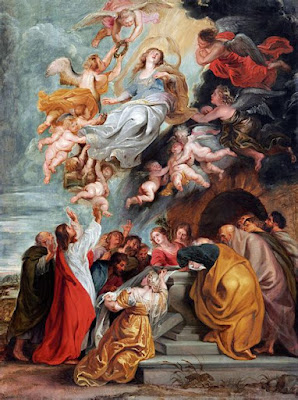Homily Notes: 08-15-21 - The Feast of the Assumption

"And behold all generations shall me blessed."
Today we celebrate the beautiful feast of the Assumption. The Assumption is the culmination of Mary's earthly life, which began at her Immaculate Conception and finished here, at the Assumption. She continues to be an advocate in Heaven, showering graces upon us.
What does this feast mean? What are we celebrating? Let’s pause today and see what it is that we truly celebrate and what it means for us.
The Immaculate Conception is when we celebrate Mary’s conception in her mother’s womb, the womb of Ann, conceived without sin. Today, we celebrate Our Lady being taken up, body and soul, into heaven, being assumed by God into heaven. This is different from the Ascension of Jesus Christ where Jesus used his own divine power to ascend into heaven. He raised Himself at the Ascension, whereas the Assumption is God bringing Mary into heaven. It wasn’t by her own power, it was only possible by the power of God.
We don’t know when this event took place. We don’t know how long after Our Lord’s own Ascension it was. We know Our Lady spent time with the apostle, Saint John. Perhaps she was a source of comfort to the Apostles during the difficulties of their missionary work. But at some point, Our Lord deemed it time to take Our Lady into heaven.
Did she die or not? We don’t know. Some theologians argue that she didn’t die because she had no sin. Our Lady had no part with sin, so there was no need for her to die. We don’t know for sure. St. Thomas Aquinas says she didn’t have to die but since Our Lord died, it is fitting that she would also give her life and die, and then be raised body and soul to heaven. We are free to hold either opinion. We need only believe that Mary’s body and soul were raised to heaven by God.
Why was Our Lady given such a great privilege? Because she was free from original sin. She deserves in a way — to the degree a human can deserve it — heaven. The Assumption is a reward reserved for her because of this great role that she was chosen for, out of all other women.
We can say that the most fitting reason for the Assumption is because she shared in the redemption, co-redemptorist. Jesus alone can truly make up for the sin of man — an infinite being who made up for infinite sin. Mary united herself completely with Our Lord and His suffering, knowing the sufferings she would have to endure. She knew what Our Lord was coming to do, she knew that he would suffer, and that as His mother she would suffer, too. She willingly chose to do so.
“Be it done unto me according to your word” - these are the most important words uttered by Our Lady. She lived a life of union with these words. She merited this great grace of being Assumed into heaven. Her life was spent doing the will of God. “Do whatever he tells you” — these are the last words of Our Lady in the Gospel.
Let's draw practical consequences: what does this mean for us? Keep in mind that we also are promised heaven by faithfully keeping the commandments of God. We are promised that our bodies will resurrect at the end of time. We are destined for heaven and that should influence all of our actions.
Another lesson: Our Lady is truly our advocate . She really did merit graces for us and now God has put her in charge of distributing graces to us and pouring them out to us because she helped to merit them. She is there in heaven and sees our needs and will answer us and give us the help we need
Sometimes we fear turning to her too much instead of turning to Jesus. Our lady is not God and we don’t turn to her as God. St. Louis says we can never love Our Lady too much because we can never love her as much as Jesus does. All praise given to Mary is praise given to God. Elizabeth praises Mary directly and Our Lady doesn’t tell her not to say that, but turns that praise to God himself, “my soul doth magnify the Lord.” — she will be praised by all generations of mankind because He who is mighty has done great things.
The Magnificat is one of the greatest prayers of the Church, it is put on the lips of the priest every day in the evening prayer of the Church. We should all pray it frequently.
Our Lady has a unique role of being the mother of God. She didn’t suffer because she had to, she suffered because she wanted to be with Jesus in everything. We can turn to her in our suffering and ask her for the graces we need in our salvation.
We see in Our Lady true humility. All we can claim is our own sin; all good comes from God.
Our Lady has true and perfect love of God. She had an ever present desire for heaven, which is our true home. We need to keep heaven in mind when we suffer, otherwise our suffering is pointless. We are not made for this earth.
Imitate Mary's example in these 3 virtues. She wants to give us the same virtues.



Comments
Post a Comment